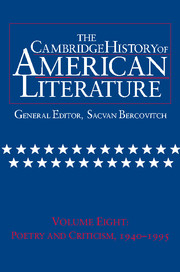Book contents
- Frontmatter
- Introduction
- Poetry, Politics, and Intellectuals
- Introduction
- 1 The Place of Poetry in the Culture, 1945–1950
- 2 Politics
- 3 Rear Guards
- 4 Avant-Gardes
- 5 Authenticity
- 6 Translation
- Conclusion: The Place of Poets, 1995
- Appendix I: Biographies of Poets
- Criticism since 1940
- Chronology 1940–1995
- Bibliography
- Index
2 - Politics
from Poetry, Politics, and Intellectuals
Published online by Cambridge University Press: 28 March 2008
- Frontmatter
- Introduction
- Poetry, Politics, and Intellectuals
- Introduction
- 1 The Place of Poetry in the Culture, 1945–1950
- 2 Politics
- 3 Rear Guards
- 4 Avant-Gardes
- 5 Authenticity
- 6 Translation
- Conclusion: The Place of Poets, 1995
- Appendix I: Biographies of Poets
- Criticism since 1940
- Chronology 1940–1995
- Bibliography
- Index
Summary
Until about 1965, the term “political” referred to the activities of the state: the conduct of foreign policy, the exercise of police authority, the control of borders, the use of the ballot, and so on. These were the matters that American intellectuals thought of as political, and most Americans still hold to this sense of the term. Poets such as Robert Lowell, Allen Ginsberg, and Robert Bly have spoken to these issues, often powerfully. But what comes under this statal sense of the political varies in detail from country to country and year to year, because the nature of a state is unstable – the areas in which state authority is exercised and the differences between one state and another are great. For instance, the Soviet state governed enough of life that the notion of privacy was political there, though it was the ostensible essence of what liberal Americans, before the advent of identity politics, considered unpolitical. Partisan Review told how Anna Akhmatova’s silence about all things political from 1923–39 was itself an act of political defiance – and the grounds for punishment in Stalinist Russia. And the history of recent American political poetry, its strengths and weaknesses, is inseparable from the unusual status that the term privacy acquired just after World War II.
This period begins dramatically with the arrest of Ezra Pound in Rapallo on May 3, 1945. He was brought to an American military prison near Pisa, where he wrote his most personal and elegiac poetry, The Pisan Cantos (1948), and later to St. Elizabeths in Washington. His career is the most spectacular instance in American literary history of the problematic relationship of poetry to politics. His name gave focus to the difficulty of bringing modernist art together with democratic politics. While Pound sat in a Washington asylum, various intellectuals took positions on the question of a poet's proper role in a republic.
- Type
- Chapter
- Information
- The Cambridge History of American Literature , pp. 23 - 55Publisher: Cambridge University PressPrint publication year: 1996



